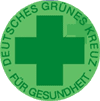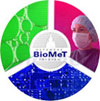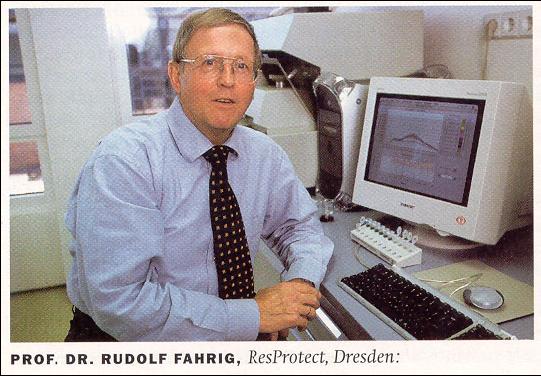|
Written by Australian Cancer Technology Ltd.
|
|
Friday, 10 September 2004 |
AustCancer Licenses Phase I/II Pancreatic Cancer Drug

ASX RELEASE
10 September, 2004
- Completed successful Phase I/II clinical pilot study
- Strong response in metastasized pancreatic cancer patients
- US Phase IIb/III pivotal trial to begin in 2005
Australian Cancer Technology ("AustCancer") (ASX:ACU) announced today that it had signed an agreement with the German company RESprotect GmbH, to acquire the North American licence to a developmental pancreatic cancer drug. The drug, RP101 has demonstrated promising results in a clinical Phase I/II pilot study. AustCancer has developed an accelerated clinical trial program for RP101 which would include application to the US FDA for Orphan Drug status.
RP101 is targeted at preventing cells from developing a resistance to chemotherapy, one of the most challenging areas facing oncologists. RP101 would be used as a co-treatment with cytostatic drugs to give a broader range of chemotherapy treatment options, thereby extending survival periods and improving quality of life for the cancer patients.
A Phase I/II pilot clinical study with 30 patients in German clinics over five tumour types (metastasized breast, metastasized ovarian, non small cell lung cancer, small cell lung cancer and metastasized pancreatic cancer) was completed in 2003 with different chemotherapy agents. An enlargement of the pilot trial, in 13 metastasized pancreatic cancer patients is still running. An interim analysis of this trial shows strong patient responses, including total remission in two patients as measured by tumour markers, and partial remission of the primary tumour in three patients as measured by computerised tomography or sonography Moreover, in two other patients, remissions of liver or lung metastases could be observed. According to the interim analysis, it seems likely that RP101 co-treatment significantly enhances survival time, remissions, time to progression and response to chemotherapy.
RESprotect’s founder and major shareholder, geneticist Professor Dr. Rudolf Fahrig commented that “the results from the Phase I/II pilot trials are extremely promising and show particular efficacy in pancreatic cancer patients. This is probably due to the fact that when tested in vitro with tumour cells, RP101 has a major effect in down-regulating the oncogene STAT3, and the DNA-repai gene APEX, which are over-expressed in pancreatic carcinoma.”
AustCancer’s Chairman, Dr Roger Aston said, “While the patient numbers in the previous pancreatic trials were small, the results appear significant. We believe that the drug may offer new or significant improvements for pancreatic cancer by satisfying unmet medical needs, and therefore might qualify for Orphan Drug status when we lodge the IND (Investigative New Drug application) in the US next year”.
A repeat Phase I/II dose finding study is expected to begin in Germany in 6-8 weeks and will be funded by AustCancer. The trial will be over two centres with 22 pancreatic patients and managed by a Swiss CRO. Following the results of this trial, which is expected to last 6 months, AustCancer will commence a pivotal Phase IIb/III trial in the US in 2005 and has already held discussions with two leading US cancer centres who are interested in running the trial. AustCancer has commenced the regulatory due diligence in the US and expects to lodge a submission with the FDA next year.
Cancer of the pancreas is the fifth leading cause of cancer deaths with mean survival time for locally metastasized pancreatic cancer of 4-6 months with a 2-year survival rate of 10%. There are approximately 20,000 new pancreatic cancer patients in the US each year.
RESprotect is closely associated with the Universities of Leipzig, Munich, Vienna and The Technical University of Dresden. The intellectual property for this development came from the Fraunhofer Society of Munich, a leader in applied research in Europe. Professor Fahrig has agreed to join the AustCancer Scientific Advisory Board.
As part of the agreement, AustCancer will also acquire 10% of the capital of RESprotect GmbH.
Bio-IB, LLC, a New York based healthcare investment bank, acted as an advisor to Australian Cancer Technology on this transaction.
ENDS
Please direct enquiries to:
Australian Cancer Technology Limited
Paul Hopper
Managing Director,
Level 36, Suite 4, 88 Phillip Street
SYDNEY New South Wales, Australia 2000
Phone: +61 2 9252 6899
Cell: +61 407 118 366
This e-mail address is being protected from spam bots, you need JavaScript enabled to view it
RESprotect GmbH
Prof. Dr. Rudolf Fahrig
Fiedlerstr. 34
D-01307 Dresden
Germany
Phone: +49 351 4503201
This e-mail address is being protected from spam bots, you need JavaScript enabled to view it
|
|
Read more...
|
|
|
Written by IMS Health Inc.
|
|
Monday, 29 March 2004 |
R&D FOCUS drugnews: RESprotect partnering opportunity, Worldwide

Focus on RESprotect - RP101
At BioSquare 2004, Rudolf Fahrig, CEO of RESprotect, discussed the company’s anti-recombinogenic agent RP 101, during an interview with R&D focus. RP 101, which acts by preventing the overexpression or amplification of oncogenes (DDX1, STAT3, and JUN-D), DNA repai genes (UBE2N and APEX) and resistance genes (MDR and DHFR) and the down-regulation of DT-diaphorase, caspases and natural killer cell factor-4, has potential utility in inhibiting the induction of chemoresistance in cancer. A phase I/II European trial o RP 101 in patients with different tumor types has been completed and RESprotect anticipates initiating a controlled phase II trial of RP 101 in patients with pancreatic cancer second half 2004. Discussions with ethical committees regarding the phase II study are ongoing.
In vitro, treatment with RP 101 in combination with mitomycin C, mitoxantrone or doxorubicin maintained the efficacy of the chemotherapy against AH13R sarcoma cells; treatment with multiple cycles of chemotherapy alone had decreasing efficacy. RP 101 was demonstrated to be efficacious in vitro in combination with doxorubicin, mitomycin C, mitoxantrone, methotrexate, etoposide, and gemcitabine. In vivo, RP 101 enhanced the efficacy of chemotherapy and tumor regression when administered in combination with doxorubicin in an AH13R sarcoma model.
In a phase I/II study, RP 101 was safe and well tolerated when administered at 5000 mg per treatment cycle to 31 patients with cancer. RP 101 also reduced certain side effects of chemotherapy. In a subset of 7 patients with metastatic pancreatic carcinoma who received RP 101 in combination with cisplatin and gemcitabine, 3 patients had disease remission and 4 patients had stabl disease; RP 101 was also found to increase the median survival of these patients. Partners are sought by RESprotect for the further development of the agent. For further information on the partnering opportunities available, see next article.
Cancer chemoresistance inhibitors, RESprotect
RESprotect is developing second generation anti-recombinogenic agents to inhibit the development of cancer chemoresistance. The agents are expected to be efficacious for all tumor types and for use in combination with any chemotherapy. Lead compounds, RP 301, RP 302 and RP 402, have been identified and are entering preclinical development. Partners are sought by RESprotect to further the development of these compounds, R&D focus was informed during an interview with Rudolf Fahrig, CEO of RESprotect, at BioSquare 2004.
For further information on the partnering opportunities available, contact:
Prof Rudolf Fahrig
Chief Executive Officer
RESprotect
Fiedlerstr 34,
D-01307 Dresden
Germany
Tel: +49 351 450 32 01
Fax: +49 351 450 32 10
Email:
This e-mail address is being protected from spam bots, you need JavaScript enabled to view it
|
|
|
Written by RESprotect GmbH
|
|
Wednesday, 10 December 2003 |
Innovative chemotherapy treatment schedules: First clinical results in prevention of chemoresistance and enhancement of chemosensitivity in cancer patients

Dresden,Germany, Dec. 10 – RESprotect GmbH today announced successful results of a randomized, single-blind, placebo-controlled phase I/II pilot study of RP101 in cancer patients. RP101 is the Company's first small molecule drug candidate given to cancer patients in combination with standard chemotherapy. This innovative treatment schedule turned out to be safe and well tolerated; in addition, certain side effects of chemotherapy were considerably reduced. Treatment of cancer patients with cytostatics in combination with RP101 will considerably extend survival of cancer patients and greatly improve quality of life.
The pilot phase I/II clinical study with 31 patients carrying five different tumor entities provided preliminary data on efficacy. Our data pointed at focussing to patients with metastasized pancreatic carcinoma. Usually, median survival time for metastasized pancreatic cancer is 3 - 6 months. Response to treatment is described to be less than 10%. In the RESprotect study it was found that three of the four patients with metastasized pancreas carcinoma treated with RP101 + cytostatics underwent remission and are still alive over a period of up to 14 months by now. Of the two patients not treated with RP101, one deceased after one month and the other after 9 months. Even though the number of patients allows no statistical analysis as yet, the treatment success is remarkable.
“The study provided first valuable data that support our unrivaled concept that RP101 prevents chemoresistance and enhances chemosensitivity,” stated Prof. Rudolf Fahrig, CEO of RESprotect. “With these promising results we shall initiate a controlled phase II study in 2004 with metastasized pancreas carcinomas. Other tumor entities will follow."
RESprotect is in the position to offer a unique solution for prevention of chemoresistance and enhancement of chemosensitivity. In contrast to the well known efforts to circumvent or decrease existing chemoresistance, this basic approach is unrivaled. Exploratory research, preclinical data and the limited results of the pilot phase I/II study point at new approaches in treatment of cancer. The development of follow-up compounds with superior characteristics offer additional applications in more indications.
Marketing of patented combination products as well as proprietary follow-up compounds with superior characteristics is planned in cooperation with well positioned multinational partners through cooperation and licensing agreements.
Contact: Prof. Rudolf Fahrig, CEO,
This e-mail address is being protected from spam bots, you need JavaScript enabled to view it
Web site: http://www.resprotect.com
|
|
|
Written by Deutsches Grünes Kreuz e.V.
|
|
Thursday, 01 August 2002 |
Deutsches Grünes
Kreuz: Neues Erfolg versprechendes Medikament zur Behandlung von vier Krebsarten
 08.2002 08.2002
Es können noch Betroffene in eine wissenschaftliche Untersuchung aufgenommen werden!
Betroffene, die an bestimmten Krebsarten erkrankt sind, haben die Möglichkeit an einer viel versprechenden Studie mit einem bei Tumoren neu eingesetzten Medikament mitzuwirken, das bei Gürtelrose schon lange im Einsatz ist. Dabei handelt es sich um Brivudin, dessen vollständiger Name Bromovinyldeoxyrudin, abgekürzt BVDU, ist. Da man mit diesem Medikament, welches zusätzlich zu einer modernen Standard-Chemotherapie verabreicht wird, schon viel Erfahrung hat, sind keine ernsthaften oder bisher unbekannten Nebenwirkungen durch Brivudin zu erwarten.
Die Behandlung bietet zunächst allen eine neue Therapiemöglichkeit, die an folgenden
Tumoren erkrankt sind und sich noch keiner Chemotherapie unterzogen haben:
- Brust-Krebs mit Töchtergeschwülsten
- Eierstock-Krebs
- Lungentumoren
- Bauchspeicheldrüsen-Krebs mit Töchtergeschwülsten
Es können derzeit nur Betroffene mit der neuen Therapie behandelt werden, die an einer dieser vier Krebsarten erkrankt sind.
Die Therapie wird momentan am Universitätsklinikum Carl Gustav Carus, Medizinische Klinik und Poliklinik I, Fetscher Str. 74, in 01307 Dresden angeboten.
Es besteht eine HOTLINE, die von 8:30 bis 17:30 Uhr besetzt ist. Interessierte erhalten
unter der Telefonnummer 0351-450-3209 Auskunft.
|
|
|
Written by BioMeT e.V. Dresden
|
|
Wednesday, 15 May 2002 |
Inhibition of chemoresistance and enhancement of chemosensitivity
 The Dresden research company RESprotect GmbH was founded in 2000 and is located close to the clinics of the University of Dresden and the Max Planck Institute of Molecular Cell Biology and Genetics. RESprotect is focused on developing new therapeutics designed to inhibit chemoresistance and enhance chemosensitivity. Main targets are cancer and infectious diseases. The drugs are used in combination with conventional therapies. The Dresden research company RESprotect GmbH was founded in 2000 and is located close to the clinics of the University of Dresden and the Max Planck Institute of Molecular Cell Biology and Genetics. RESprotect is focused on developing new therapeutics designed to inhibit chemoresistance and enhance chemosensitivity. Main targets are cancer and infectious diseases. The drugs are used in combination with conventional therapies.
1. Cancer
More effective chemotherapy with fewer side effects:
Cancer is the second leading cause of death in Europe and North America. RESprotect is focusing on the inhibition of chemoresistance and the enhancement of chemosensitivity against cytostatic treatment. This is supposed to increase the recovery chances for patients and to reduce the side effects of chemotherapy.
|
|
Read more...
|
|
|
Written by Sächsische Zeitung
|
|
Friday, 30 November 2001 |
Krebsbehandlung soll verbessert werden
 30.11.2001. In Pilotstudie des Dresdner Uniklinikums wird ein Medikament gegen die Chemoresistenz getestet. 30.11.2001. In Pilotstudie des Dresdner Uniklinikums wird ein Medikament gegen die Chemoresistenz getestet.
Jedes Jahr erkranken rund 350.000 Menschen in Deutschland an Krebs. Die häufigste Behandlungsmethode ist die Chemotherapie. Künstliche hergestellte Arzneimittel sollen die Tumorzellen nicht nur in ihrem Wachstum hemmen, sondern anregen, sich selbst zu töten. Allerdings gibt es für diese "Selbstmordkommandos" ein großes Problem: Die Patienten entwickeln während der Behandlung eine Resistenz gegen die Zytostatika, wie die Mittel in der Fachsprache heißen. Diese Resistenzbildung ist ein ganz natürlicher Abwehrmechanismus des Körpers. Das ist die Ursache, dass Chemotherapien oft versagen.
Das Problem ist seit Beginn der Krebstherapie, also seit 1948, bekannt, sagt Prof. Dr. Rudolf Fahrig. Er ist Genetiker und hat vor sieben Jahren in der Fraunhofer Gesellschaft in Hannover diesem Problem den Kampf angesagt. Fahrig hat ein völlig neues Verfahren entwickelt, das die Chemotherapie-Resistenz verhindern soll. Dazu werden den Patienten spezielle Medikamente gegeben, die sogar noch zusätzlich die Wirkung der Behandlung verstärken.
Das patentierte Verfahren wurde erfolgreich an Tieren getestet. Jetzt startet am Dresdner Universitätsklinikum eine Pilotstudie, nachdem die Ethik-Kommission der Uni dafür grünes Licht gegeben hat. Eigens für die Grundlagenforschung und praktische Umsetzung des Verfahrens hat Fahrig die kleine Firma RESprotect gegründet, die direkt am Uniklinikum ihren Sitz hat.
Federführend bei der Pilotstudie ist der Leukämie-Spezialist Prof. Dr. Gerhard Ehninger. Doch nicht Patienten mit Blutkrebs, sondern mit Brustkrebs, Eierstockkrebs und Lungenkrebs sollen in diese Studie einbezogen werden, um die Substanz auf ihre Wirksamkeit zu testen. Voraussetzung dafür ist, dass sie bisher noch keine Chemotherapie erhalten haben.
Prof. Fahrig will möglichst vielen Betroffenen die Chance geben, sich an der Pilotstudie zu beteiligen. Daher hat er Chefärzte von Krankenhäusern und niedergelassene Onkologen über das Vorhaben informiert. Neben dem Uniklinikum selbst interessieren sich Kliniken in Dresden und im gesamten Regierungsbezirk für die Studie und haben ihre Teilnahme signalisiert. Ab Ende nächster Woche wird das Vorhaben ausführlich im Internet vorgestellt.
Patienten, die daran Interesse haben, sollten ihren behandelnden Aruzt danach fragen. Zusätzlich zur normalen Chemotherapie erhalten sie vier Mal täglich ein Medikament, also eine Tablette, das verhindern soll, dass sich der Körper auf die Behandlung einstellt und Gegenkräfte entwickelt, die den Erfolg in Frage stellen. Anfang kommenden Jahres soll die Pilotstudie deutlich erweitert und auch auf andere Tumorarten ausgedehnt werden, um danach das Medikament zur Zulassung anzumelden. Wenn alles klar geht, könnte es 2005 auf den Markt kommen und somit die Chemotherapie entscheidend verbessern.
www.chemoresistenz.com
www.resprotect.de
|
|
|
Written by Wirtschaft & Markt
|
|
Thursday, 01 February 2001 |
Wirtschaft & Markt – 01.2001 „Erfolgreiche Biotech-Unternehmen im Osten“ 
Wirkstoff gegen Arznei-ResistenzÜber das Marktpotential seiner künftigen Produkte sagt Prof. Rudolf Fahrig: "Es rechtfertigt den Einsatz von hohem Risikokapital." In drei Jahren verfügt seine Firma über mehr als zehn Millionen Mark, bereitgestellt von drei Risikokapitalgesellschaften sowie aus Fördertöpfen. Es geht um die Chemoresistenz bei Menschen und Bakterien - ein in der klinischen Praxis häufig zu beobachtendes Problem: Tumoren widerstehen der Chemotherapie, gefährliche Bakterien den Antibiotika. Das Grundprinzip ist ein molekularer Abwehrmechanismus, die Zellen wehren sich gegen Stress und Vergiftung. Dies beginnt mit einer Vervielfältigung von Genen, die für die Mobilisierung der Zell-Abwehr zuständig sind. In 15 Jahren Forschung hat der Genetiker Rudolf Fahrig ein Wirkprinzip gefunden, das diese Genvervielfältigung verhindert. Vor einem halben Jahr gründete er seine Firma RESprotect, die das Prinzip u.a. mit Screeningsystemen auf Genebene weiter erforscht. Was zog ihn nach Dresden? Vor allem zahlreiche Einrichtungen, die auf dem Gebiet der Genetik forschen werden, sagt er, und natürlich auch Fördergelder. RESprotect wird von derzeit vier Beschäftigten auf nicht viel mehr als zehn Mitarbeiter anwachsen. Prof. Fahrig setzt vor allem auf die Arbeit von Kooperationspartnern. Es werden mindestens fünf, sechs Jahre vergehen, bis ein Medikament auf dem Markt ist. Nach den klinischen Studien wird sich erweisen, ob die Firma auf dem richtigen Weg ist. 
|
|
|